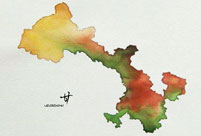 Africans in Guangzhou
Africans in Guangzhou
 Pole dancer shows strength and beauty up in the air
Pole dancer shows strength and beauty up in the air
 College girls call for protection of ecological space on earth
College girls call for protection of ecological space on earth
 Top 10 celebrities driving auto brands
Top 10 celebrities driving auto brands
 10 low-carbon tips to save money
10 low-carbon tips to save money
 Luxury cars make Asia premiere at Auto China
Luxury cars make Asia premiere at Auto China
 Versatile dog
Versatile dog
 Ni Ni covers BAZAAR JEWELRY
Ni Ni covers BAZAAR JEWELRY
 Cherry blossoms reach peak bloom in Washington D.C.
Cherry blossoms reach peak bloom in Washington D.C.
 Top Chinese fashion icons in foreigners' eyes
Top Chinese fashion icons in foreigners' eyes
 |
| File Photo |
A global Internet governance conference in Brazil concluded last Tuesday with a strong demand for building an effective worldwide legislative framework, while a series of Internet-related optional standards had been drafted.
The Internet has spread its influence into every aspect of life around the world. But while people enjoy the conveniences that the Internet brings, they are also starting to worry about security and privacy issues and the possible negative impacts of the Internet. Last year, revelations about the American “Prism” program triggered global concerns about surveillance, resulting in calls for protecting the individual, and strengthening Internet governance
Last month, the U.S. announced its plans to turn over the Internet Corporation for Assigned Names and Numbers, known as ICANN, to a “global multi-stakeholder community”, which sent a positive message to the world. But the obligations of Internet governance should go beyond IP address allocation into control of Internet technical standards and a focus on how countries can build a secure, open, transparent, and ordered web environment.
Internet governance should admit and respect a self-regulated space free of government interference in all countries, subject to a country’s level of technology, language, and culture, and people’s wishes in terms of relevant legislation. A country should also be able to supervise its information infrastructure, information resources, and online activities in accordance with laws designed to protect the interests of its people.
Internet governance should focus on extensive cooperation among all stakeholders against a backdrop of a tolerant and fair attitude. Any country, big or small, rich or poor, should have both the obligation to participate in Internet governance, and the right to enjoy opportunities created by IT development.
Internet governance should uphold open, transparent, and win-win principles for general cooperation. The decision-making on Internet standards, rules, and policy should be open and transparent; developed countries should be encouraged to help developing countries in improving network techniques and narrowing the information gap.
Internet governance should insist on both rights and obligations. A country should uphold the right to privacy by ensuring the effective implementation of all obligations under human rights law. Everyone should be able to enjoy the right to and freedom of the Internet, subject to not damaging the interests of other people or the country, and not breaking the law or damaging social morality.
The key for global Internet governance is to promote close cooperation among countries, and build a practical network of international Internet-related rules and standards. All opinions and proposals from all countries should be heard with equal importance while defining rules suitable for all countries.
The article is edited and translated from 《互联网治理,规范和标准是关键》, source: People's Daily
 Hand-painted maps go viral online; painter's name remains unknown
Hand-painted maps go viral online; painter's name remains unknown 4th Beijing Int'l Film Festival ends
4th Beijing Int'l Film Festival ends Commando elite specializes in sign language
Commando elite specializes in sign language Man photoshops himself into girlfriend's childhood photos
Man photoshops himself into girlfriend's childhood photos Photo story: Stallholders at Beijing Zoo Wholesale Market
Photo story: Stallholders at Beijing Zoo Wholesale Market Artists on backstage
Artists on backstage Beckham launches fund to support youth soccer in China
Beckham launches fund to support youth soccer in China Cherry blossoms hit peak bloom in Washington D.C.
Cherry blossoms hit peak bloom in Washington D.C. Children in ancient costumes learn Zhusuan
Children in ancient costumes learn Zhusuan Cute Shaolin boy melts the hearts of millions
Cute Shaolin boy melts the hearts of millions Giant panda Sijia is back to happy life
Giant panda Sijia is back to happy life Richest Chinese of 2014: half from the mainland
Richest Chinese of 2014: half from the mainland Chengdu - laid-back lifestyle makes happiest city
Chengdu - laid-back lifestyle makes happiest city The backstage of the Fashion Week
The backstage of the Fashion Week College students in Han costumes
College students in Han costumesDay|Week|Month